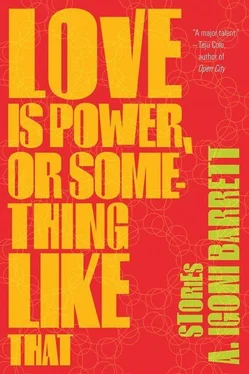It was a new year, a new era, people believed, and so they gave their support to the regime. They cheered when politicians were convicted for corruption by military tribunals, when suspected criminals were executed without trial, when the civil service was purged. Given the harshness of the medicine, it was easy to believe the country would change for the better. Signs of the new season were already there: for the first time in the nation’s history, her people, threatened by the whips of soldiers who enforced the regime’s War against Indiscipline campaign, formed queues at bus stops.
Euphoria passed. Decrees began to rankle. Journalists, artists, and men of conscience who dared speak out were stalked and bundled into detention by secret police. The economy, burdened by debt, nosedived. In a flamboyant effort to counter currency traffickers, the color of the naira was changed, but the success of this policy was thrown in the shade by the wage cuts and lost savings and broken businesses that resulted. The constitution was suspended; labor unions were dissolved; austerity measures were adopted; the borders were closed. Apart from bus stops, long queues formed in front of banks, embassies, and supermarkets, whose shelves the importation bans had denuded. Unemployment rose, and so did crime, despite the ease with which the death penalty was applied.
University students stripped of their subsidies, public servants faced with mass retrenchment, unpaid pensioners, all took to the streets in protest. Wherever unrest appeared, it was crushed.

On the day in February 1984 that Brunei celebrated independence from Great Britain with a banquet that had 4,237 guests in attendance, fifty-one-year-old Godspeed Anabraba was compulsorily retired from the civil service. He was a permanent secretary, and he had worked for government since the early, heady days of independence, so the military authorities could not believe he wasn’t corrupt. They planned to dismiss then detain him, but despite their investigations, despite the two times they raided his house — which he showed evidence of having bought from the government in 1976—and despite how far back they dug into his employment records, they could not uncover any proof of impropriety. After months of petitions, of backdoor interventions from the influential friends he had gathered in his long career, the authorities allowed him to keep a fraction of his financial assets as well as the house he lived in, but they canceled his pension and confiscated the country home he had built in his mother’s honor, his bungalow in Lagos, his three cars, his scattered parcels of land, and his wife’s upmarket restaurant, then sold everything off in a private auction. His offence, he was informed in a letter rife with bad spelling, was “plain for all to sea.”

At sixteen, Daoju was a queen. She had the beauty, the carriage — and, in her father, the king. It was not disputed, in public or at home, that she, the child, was the love of his life. She had her father’s ear, his heart, his complete trust. On days that he brought home large amounts of cash, it was into Daoju’s care he placed the money. Between April 1975 and September 1983 he traveled to conferences in five European countries, one Asian, one African, and two US cities, and Daoju had accompanied him three times, Perpetua once. When relatives visited, seeking favors from the big man, it was to Daoju they directed their entreaties, it was her attention they courted. Perpetua had long since given up efforts to usurp her daughter: between mother and child there existed a fragile, unspoken truce.
Daoju adored her father. She loved him with a fierce, electric passion. He was a man; he was her model for a man. He told her everything, gave her everything. She, in turn, opened her life to him. The few secrets she kept were those she knew would embarrass him. Like the real reason she did not like red wine, because it affected her monthlies and infected her moods. Or, again, that she had never been kissed, not for lack of wooing, but because none of the men, measured against her father, was man enough.

After retirement, Godspeed changed. His promise to himself had been broken. At the height of success, he had failed. His reputation had been assailed and his property stolen, and there was nothing, absolutely nothing he could do. Day after day, he sat at home, gorging himself to plumpness, watching re-reruns of British sitcoms in bed, reading the dailies in his dust-covered study, sleeping sprawled in his favorite chair with his mouth gaped open, purposeless.
Perpetua, too, after the loss of her business, her seven-year-old restaurant, remained at home. She cooked; she cleaned the house; she cried at night in her bedroom. She had good reason to grieve: her husband was a shell of himself. He had lost his spirit, his confidence; and, also, he was bleeding money. Two companies in which he held major shares had crashed. The regime’s currency change had halved the value of the savings left him. When money began to run low, when the quality of life she was accustomed to could not be afforded, Perpetua, out of fear, quarreled with her husband, her daughter, her neighbors, anyone who was near. The Anabraba house became a desolate place. Favor seekers donned masks of sympathizers and trooped in like vultures, in search of pickings. Visitors dwindled, and then stopped. The large, colonial house, which once echoed with prosperity, was now as hushed as a mausoleum.

Three days, one hour, and fourteen minutes before she turned seventeen, Daoju challenged her father for the first time. At 10:46 p.m. on September 8, 1984, she told him, “You’re not man enough to stop me from leaving this house.” Later, for the rest of her life, she realized that was the moment she killed the man who loved her most.
The day had started badly. Daoju woke up that morning to the sound of her mother hurling abuse at her father. This one-way stream of invective was a routine of late, but she usually left for school before it began. It was a Saturday; there was no excuse to leave the house early. So she lay in bed and shared her father’s shame, heard his little secrets, his psychological farts. She felt trapped in a hell that was all her own. She squeezed her eyes shut, curled up under the bedcovers, and tried not to listen as her mother, spluttering with rage and tears, called her father:
a waste of time
a sad excuse for a man
a spineless failure
a stone round her neck.
He remained silent, her voice grew shriller, and she said he was:
a baboon wey dey chop when monkey dey work
a chicken
a pig
a big fat pig.
The insults seemed only to add to her mother’s anguish, as her father did not reply, did not defend himself, did not rise and slap her shut. Daoju wept into her pillow.
Perpetua left the house at midday to visit her ailing father — eighty-one years old and nursing a cancerous prostate gland — whom she meant to ask for money to buy food for the house. Alone with her father, Daoju gave in to an impulse she had fought for weeks. She rolled off the bed, removed her nightgown, and rummaged in the middle drawer of the redwood dresser for what to wear, thinking of what to say to her father, all the words she would tell him to make things right again.
She entered his study to find him asleep. He was aging fast. His thick, uncombed hair and chin stubble were dusty with gray, and the wrinkles in his forehead were as deep as knife cuts. In seven months he had grown a double chin, sagging breasts, and an overhanging paunch. His breath wheezed through his wet, drooping lips.
Читать дальше


![Сьюзан Кейн - Quiet [The Power of Introverts in a World That Can't Stop Talking]](/books/33084/syuzan-kejn-quiet-the-power-of-introverts-in-a-wo-thumb.webp)










